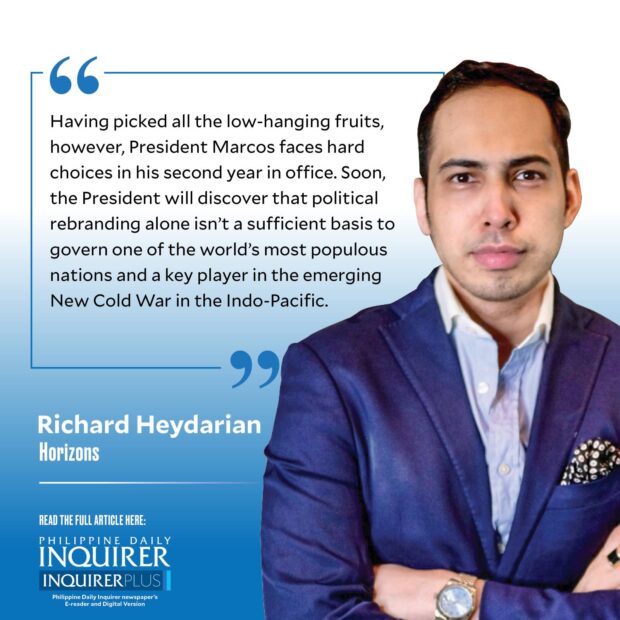Marcos Year 2: A political reckoning?
 One of the greatest illusions of the 20th century was the presupposition that humans are fundamentally rational beings. But just as the Great Recession of 2007-2008 reminded the world of the limits of mainstream economies, with its delusions of efficient and self-correcting markets scaffolding public policy, the recent wave of populist revolts across the world’s oldest democracies has undermined faith in mainstream political science. This doesn’t mean that human beings are irrational per se, but instead that we are complex and multifaceted species.
One of the greatest illusions of the 20th century was the presupposition that humans are fundamentally rational beings. But just as the Great Recession of 2007-2008 reminded the world of the limits of mainstream economies, with its delusions of efficient and self-correcting markets scaffolding public policy, the recent wave of populist revolts across the world’s oldest democracies has undermined faith in mainstream political science. This doesn’t mean that human beings are irrational per se, but instead that we are complex and multifaceted species.
The great economist John Maynard Keynes often spoke of “animal spirits” as the driving force behind capitalist boom-and-bust cycles in the early modern era. His intellectual successors, most notably Alan Greenspan, spoke of “irrational exuberance.” In politics, cognitive biases shape voter behavior.
As Nobel laureate Daniel Kahneman argues: even the smartest and most intellectually accomplished human beings are not impervious to seemingly irrational behavior. This is primarily due to evolutionary biology, namely the whole package of defense mechanisms our ancestors had to develop in order to survive the Savannah of pre-historic times.
Article continues after this advertisementAt the heart of human behavior is an ingrained instinct to respond to the primordial forces of fear and greed. Reason, as Scottish philosopher David Hume correctly explained centuries earlier, can often end up as the slave of passions. And dear reader, this is precisely where our analysis of the simultaneous ascent of the House of Duterte and (reemergence of) the House of Marcos should be understood.
This is less about the supposed irrationality of our voters, but instead about the impact of our “age of uncertainty” on modern democracies. As in countless voters in India, Brazil, Indonesia, and Turkey—not to mention America’s Midwest, rural France, and England’s northern regions—authoritarian populism’s appeal to Filipinos is in its ability to provide (false) certainty and (fantastical) promise of prosperity amid (real and manufactured) crises.
Rodrigo Duterte’s populist presidency was enabled by a climate of fear, while Ferdinand Marcos Jr.’s emphatic return to power was the upshot of deep-seated grievances against dysfunctions of quasi-democratic politics. The power of disinformation was both a symptom of systemic dysfunction as well as an amplifier of a climate of fear and rage, which decimated mainstream liberal politics for the foreseeable future. Only shallow analysts and self-serving apparatchiks would insist that disinformation alone explains our current democratic crisis.
Article continues after this advertisementNevertheless, President Marcos’ political honeymoon won’t last forever. Sure, he is a beneficiary of the failures of both his immediate predecessor, who disastrously mismanaged both the COVID-19 pandemic as well as our external relations, as well as the shortcomings of numerous reformist-liberal presidents in the past three decades.
The reason why Mr. Marcos has been, quite ironically, welcomed as a “breath of fresh air” by the West is not necessarily because of what he does, but instead what he doesn’t: namely, his retrenchment of the worst aspects of the Duterte presidency, including a bloody drug war, a slavish predisposition toward Beijing, and a needlessly pugnacious attitude toward critics.
In this sense, any appreciation of Mr. Marcos’ first year in office is often driven by what can be described as “reference bias,” namely, how the incumbent is an improvement relative to his immediate predecessor. For loyalists, meanwhile, he is seen as a harbinger of a new “golden era” of illiberal politics.
Having picked all the low-hanging fruits, however, Mr. Marcos faces hard choices in his second year in office. He will soon have to decide how far he is willing to align with the United States amid a raging New Cold War in Asia. This has implications not only for his outreach toward Beijing, but also for pro-China elements within his own ruling coalition.
Not to mention, Mr. Marcos will also have to decide how far is he going to shield his predecessor against probable International Criminal Court investigations. Perhaps most crucially, Mr. Marcos will also have to decide how far he is willing to shake up the Philippines’ oligarchic economic system in order to bring about transformative reforms, which ensure inclusive and sustainable development.
Soon, the President will discover that political rebranding alone isn’t a sufficient basis to govern one of the world’s most populous nations and a key player in the emerging New Cold War in the Indo-Pacific.
—————-
rheydarian@inquirer.com.ph
















